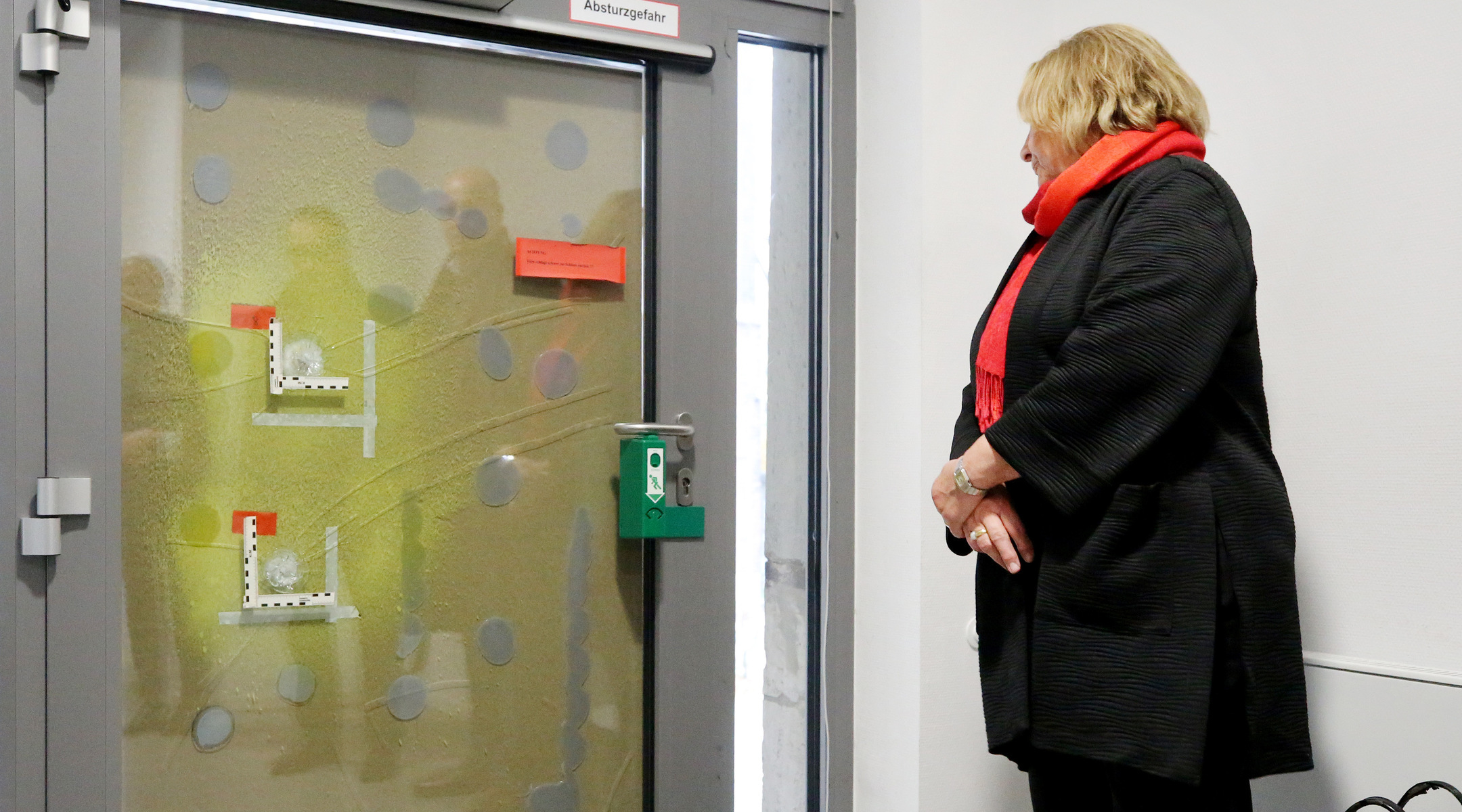Iran’s Revolutionary Guard is responsible for shooting at German synagogue, officials say
German intelligence officials revealed in December that they believed the Essen shooting and two other synagogue attacks at the same time had ties to Iran

Sabine Leutheusser-Schnarrenberger, the anti-Semitism commissioner of North Rhine-Westphalia, Surveys the Bullet holes on the door of Essen’s Old Synagogue. (Photo by Roland Weihrauch/picture alliance via Getty Images)
(JTA) — After a century-old synagogue in Essen, Germany, was struck by two bullets last November, news reports connected it to the shooting at a synagogue in Halle three years earlier that had been perpetrated by a far-right German extremist.
But authorities quickly connected the Essen shooting to a different kind of perpatrator: Ramin Yektaparast, a biker gang leader wanted on suspicion of murder in Germany who now lives in Iran and is accused of directing antisemitic attacks from there.
German intelligence officials revealed in December that they believed the Essen shooting and two other synagogue attacks at the same time had ties to Iran. Last week, The Washington Post quoted anonymous German and U.S. intelligence sources who named Yektarapast as a suspect, and as an alleged asset of Iran’s Revolutionary Guard Corps. The United States considers the Revolutionary Guard a terrorist organization, though Germany does not.
Yektarapast fled from Germany to to Iran in 2021 after being suspected of the grisly murder of a fellow member of the Hells Angels gang. Involving criminals in terrorism plots is part of Iran’s playbook, a former U.S. counterterrorism official told the Washington Post.
Matthew Levitt, a fellow at the Washington Institute for Near East Policy, said Iranian agents have seen high-level assassination plans foiled and now are turning to “softer” targets in their efforts to sow terror and harm their country’s enemies.
“That’s when the plots targeting Jews come into play,” Levitt said.
Reports of Iran-linked terror cells targeting Jews or Israelis in Europe have been widespread in recent years. Last summer, as a record number of Israelis visited Turkey, Israel’s intelligence service, the Mossad, and its Turkish counterpart, hunted through Istanbul for an Iranian cell. The cell had reportedly been tasked with targeting Israeli tourists in retaliation for the killing of an Iranian colonel in Tehran, allegedly by Israeli operatives.
Later last year, the Washington Post reported that Iran had targeted prominent Jews and Israelis around the world, including the French Jewish philosopher Bernard-Henri Levy. Josef Schuster, the head of the Central Council of Jews in Germany, has also been targeted, according to German authorities.
Iran’s attacks on Jewish and Israeli targets abroad are not new. Multiple investigations have implicated Iranian agents in the bombing of the AMIA Jewish community center in Buenos Aires in 1994, which killed 85 people. Officially, the case remains unsolved. (Two of the agents suspected in the bombing are among Iran’s senior officials today.)
The reports of Iranian involvement in attacks against Jews in Germany come as the country has reported a rise in antisemitic hate crimes. National data showed a 29% rise in reported hate crimes against Jews in 2021 compared to the previous year. This week, new data from Berlin showed that reports of antisemitic crimes rose sharply in 2022, with nearly 700 incidents reported compared to 386 in 2019, according to Judische Allgemeine, a German-Jewish newspaper. The incidents included both violent and nonviolent incidents, including vandalism.
That period coincided with an anti-vaccination movement that included comparisons between pandemic restrictions and the Holocaust, a possible crime under Germany’s restrictive laws against Holocaust denial and minimization. In Munich, for example, a Jewish leader filed antisemitic harassment charges against two leaders of a protest rally on Kristallnacht, the anniversary of the acceleration of the Nazis’ campaign against the Jews.
That period also saw a crackdown on activity by far-right extremists in Germany. Authorities arrested dozens of people in December who they said were planning to try to overthrow the government. Last May, German police found explosives and antisemitic, far-right literature at the home of a teenager they suspected of planning to attack at a school, also in Essen.
Germany announced a comprehensive plan to combat antisemitism in December, the country’s first.
This article originally appeared on JTA.org.






















